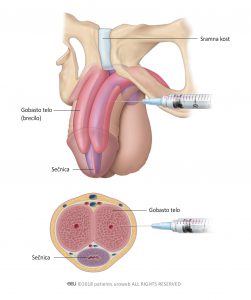Table of Contents
What are intracavernous injections?
Intracavernous injections are a treatment option for ED where you inject drugs into the spongy tissue in the penis to open the blood vessels.
When should I consider intracavernous injections?
Intracavernous injections are a treatment option if previous treatments such as lifestyle changes or PDE5Is were unsuccessful. Although many men will be scared by the idea of placing a needle into their penis, most men who choose injection therapy quickly realise that the benefits of the injection far outweigh a little pinprick.
How do intracavernous injections work?
The drugs in intracavernous injections relax smooth muscle in the vessels in the penis to increase blood flow. This results in an erection 10-15 minutes after the injection, even without sexual stimulation.
The most common drug used for intracavernous injections is alprostadil. In some cases, your doctor may recommend a combination of drugs to improve the effectiveness or reduce the side effects. Common drugs include: papaverine, phentolamine, vaso-active intestinal peptide, atropine and forskolin. Dosages may vary and can be adjusted as needed. Keep in mind that not all drugs are available in all countries.
How do I perform an intracavernous injection?
You might receive an in-office training from your urologist to learn how to inject yourself. In some cases, your partner may receive training as well. During the training, the urologist will also discuss the correct dosage with you.
The location of the injection is important. Make sure to inject at the base of the penis, and between 2 and 4 ‘o clock, or 8 to 10 ‘o clock positions in order not to damage the urethra or the nerves and blood vessels in the penis. Then, gently apply pressure for 2-5 minutes at the injection site to prevent bruises. If the correct dosage is injected, you will have an erection within 10-15 minutes.
When are intracavernous injections not recommended?
You should not use intracavernous injections when you are hypersensitive to any ingredients in the drug, when you are at risk for priapism, or when you take medications to prevent blood clotting. Your urologist can give your more in-depth information on these contraindications and discuss your individual situation.
What are the side effects?
The most common side effects of injections is pain in the penis during erection. This happens in about 1 out of 10 injections and the pain usually stops when the erection ends. Another minor side effect is bruising at the injection site.
The most serious side effect is priapism. This means that an erection lasts longer than 4 hours, and is painful. Priapism may damage the smooth muscle cells in the penile vessels and can worsen ED. It is very important to contact your doctor if you have an erection that lasts longer than 2-3 hours. Generally, priapism can be treated effectively with the injection of an antidote.


